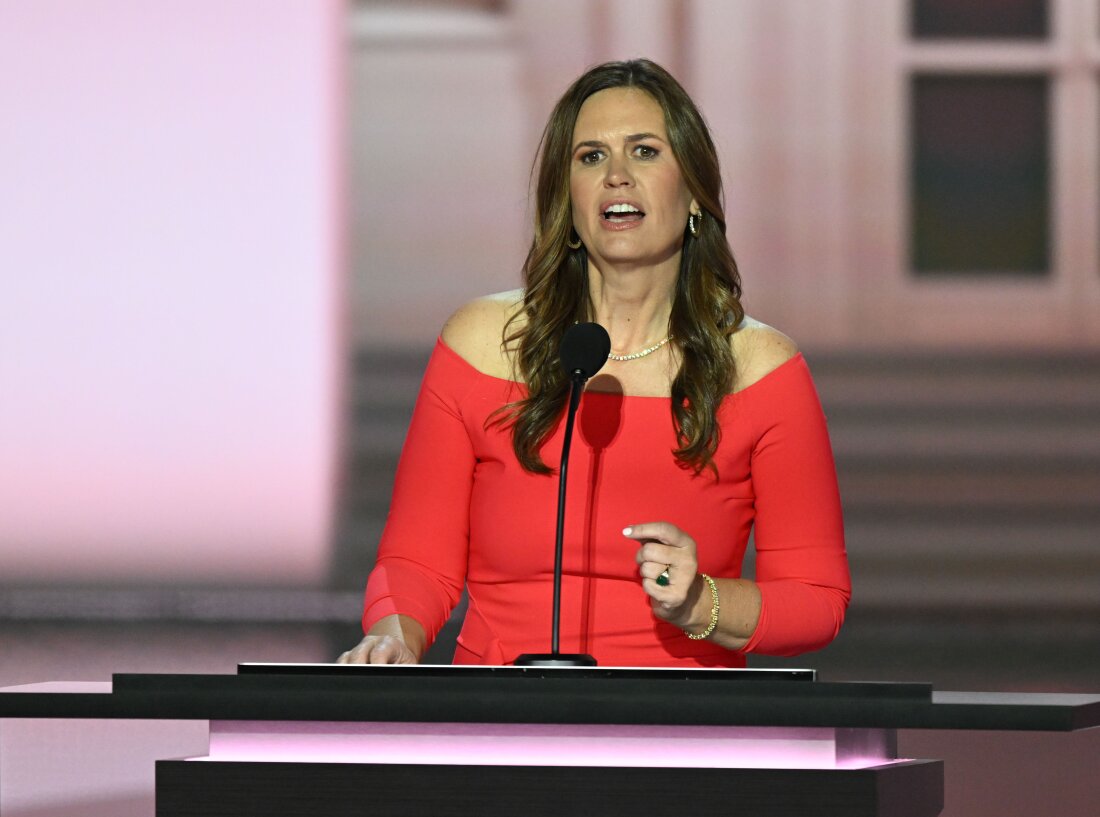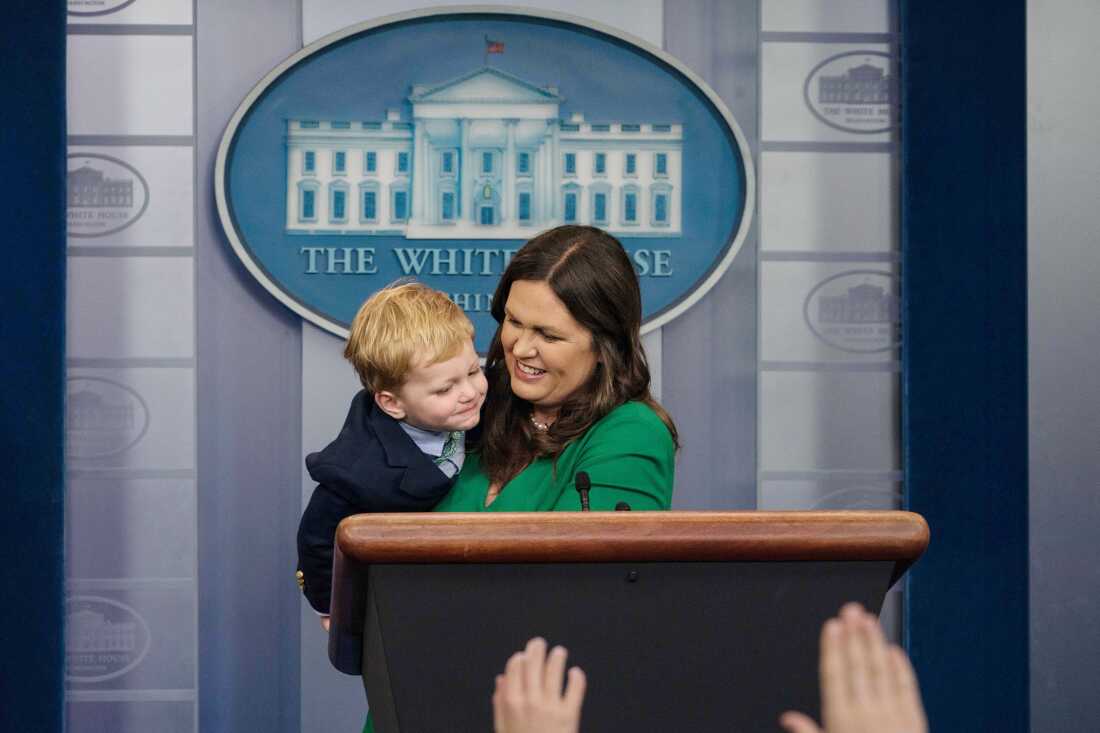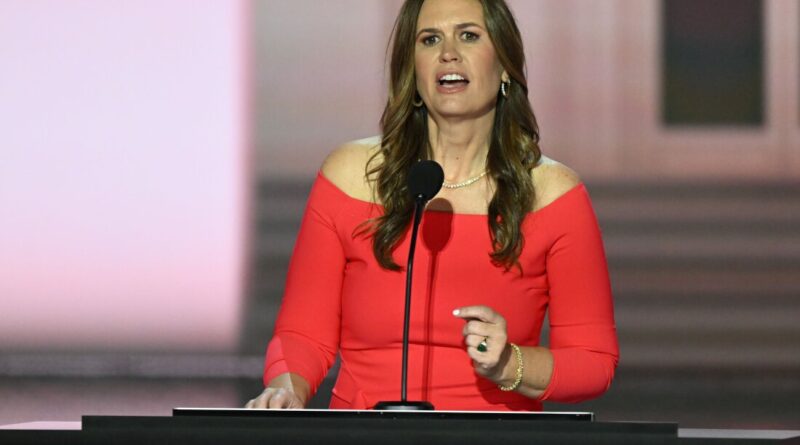The state of Arkansas says the expansion of Medicaid for new mothers is unnecessary. Counselors disagree

Arkansas Governor Sarah Huckabee Sanders speaks at the Republican National Convention in July. He said Arkansas doesn’t need a “replicable program” to address its maternal mortality issues.
Joshua Lott / The Washington Post via Getty Images
hide description
toggle caption
Joshua Lott / The Washington Post via Getty Images
Six weeks after the emergency surgery, with her newborn twins still in neonatal intensive care, Maya Gobara went to a pharmacy in West Little Rock, Arkansas, to fills the prescription.
“The chemist told me I don’t have insurance,” Gobara said.
Arkansas is the only state that has not taken steps to expand so-called postpartum Medicaid coverage, an option for states paid almost entirely by the federal government that ensures poor women have health insurance. uninterrupted health for a year after giving birth. Forty-six states now have the provision, promoted by the Biden administration, and Idaho, Iowa and Wisconsin have plans in place to enact legislation or have bills pending in the courts. they are legal.
Nationwide, 41% of births were covered by Medicaid in 2021. Federal law requires states to provide pregnancy-related Medicaid coverage within 60 days of delivery. But maternal health advocates say Arkansas typically begins the process of removing women from the program after six weeks, or 42 days.
Gobara says she thinks that’s what happened to her: She was transferred to another health plan with a different group of doctors, and she didn’t receive notice of the change.
“a ton of bricks”
Gobara, 38 and a freelance writer, says the change to the health plan happened to her as her previous health problems — autoimmune disease, post-partum depression, and rheumatoid arthritis – appeared.
“Everything I had before hit me like a ton of bricks right after I had the boys,” she said.
Maternal health advocates say many low-income women in Arkansas fall into that common health care gap.
Arkansas has one of the highest maternal mortality rates in the nation, an alarming number of women who die from any cause related to pregnancy or childbirth, including weeks after giving birth. In Arkansas, 20% to 29% of women are uninsured at some point before conception until after they give birth.
In March, Arkansas Governor Sarah Huckabee Sanders, a Republican, signed an executive order to create a committee of experts charged with improving the state’s poor maternal health outcomes and better educating women about options. see health insurance.
At a press conference announcing the plan, Governor Huckabee Sanders said, “This special task force that we’re creating by executive order will look at every option on the table.”
When asked by reporters at a press conference whether he would support expanding postpartum Medicaid to 12 months of coverage as other states have done, the answer was “no.” ” solid.
“I don’t believe that creating a new program for the sake of creating a program is really going to fix the problem,” he said. “We already have many women who do not take advantage of the issues that exist. Providing more protection doesn’t make more women go to the doctor.”
Huckabee Sanders, 42, is the youngest current governor and the parent of three school-aged children.

Sarah Huckabee Sanders plays with one of her sons in the briefing room on “Take Your Daughters and Sons to Work Day” when she was White House spokesperson in 2018.
NICHOLAS KAMM/AFP via Getty Images
hide description
toggle caption
NICHOLAS KAMM/AFP via Getty Images
Paperwork obstacles
In Arkansas, postpartum women can apply for additional insurance coverage six weeks after giving birth, but they must submit a paper application, said Zenobia Harris, executive director. of the Arkansas Birthing Project, a mentoring program that works with pregnant and laboring women.
Women are told things like their documents are lost or misplaced or they have to resend the papers. They stop when they make phone calls to try to connect with people,” Harris said. “So, some people, they give up trying.”
Low-income women, like Maya Gobara, are referred to ARHOME, a government program introduced by Huckabee Sanders, which uses Medicaid money to buy health insurance.
The transition to new health insurance came for Gobara when her twins, Amir and Bryson, were still on breathing tubes and required multiple surgeries. brain and needed urgent surgery.
“I was supposed to have my gallbladder removed in one week, but with this new policy I needed a referral for that surgery, but I couldn’t see my primary care doctor anymore because it was not under the plan they had put me under. ,” he said.
Suffering from gallstones, Gobara spent days sorting out what happened to her postpartum Medicaid coverage.
“It felt like the system was set up so I’m going to surrender,” Gobara said. And, honestly, if it wasn’t for my mom sitting next to me and helping me through step by step, I probably would have given up.”
Advocates weigh in
New mothers should not be locked into planning or feeling insecure about their lives and their newborns, said Camille Richoux, director of health policy for of Arkansas Advocates for Children & Families, a nonprofit advocacy and policy group. Richoux is part of the governor’s maternal health initiative, a committee tasked with making recommendations to improve maternal health and increase access to maternal health services.
Richoux said switching to a new health plan could disrupt continuity of care when health care is essential. “Especially when most pregnancy-related diseases appear after 60 days-postpartum,” he said.
The committees tasked with making recommendations to Huckabee Sanders have been meeting this summer and have recently prepared draft recommendations.
But missing from the list is an expansion of Medicaid coverage after childbirth, despite the widespread agreement of health organizations and the National Committee for the Study of Maternal Diseases that doing so would reduce morbidity related to pregnancy.
One of the tasks of the maternal health plan is to “ensure that Medicaid does a better job of educating postpartum women about their health insurance options that are available today, to ensure they are registered and get the protection they need,” said Alexa Henning, in an interview. director Huckabee Sanders in an email last month.
“The data shows that most women have ongoing coverage, they just need to find it,” Henning said. “But if we point out gaps, the governor is open to all options to help mothers and babies.”
Final recommendations are expected to be released this month.
KFF Health News is a national newsroom that produces in-depth journalism on life issues and is one of the main programs operating in KFF .
#state #Arkansas #expansion #Medicaid #mothers #unnecessary #Counselors #disagree
